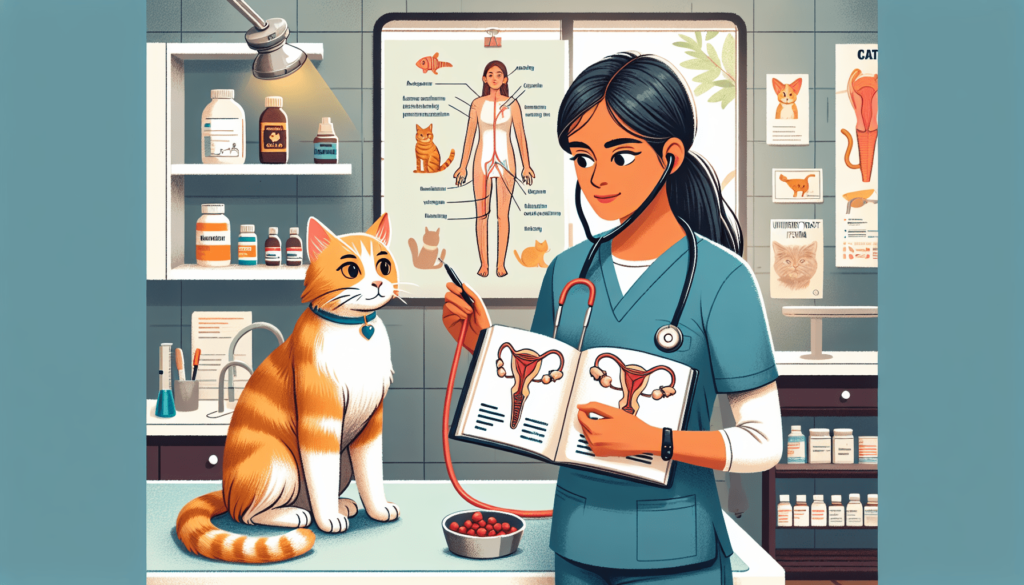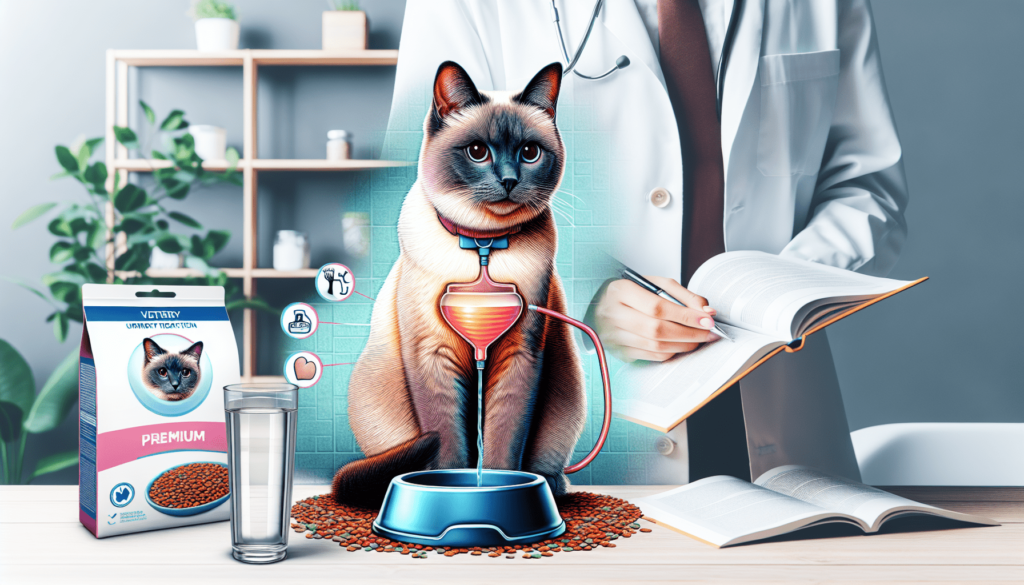If you’ve noticed your beloved feline companion exhibiting signs of a urinary tract infection (UTI), such as frequent trips to the litter box, straining to urinate, or even blood in their urine, you may be wondering how to help them find relief. Luckily, there are several effective home remedies that can provide gentle and natural treatment options for your cat’s UTI. From increasing water intake to incorporating special dietary changes, this article will guide you through the steps you can take to alleviate your cat’s discomfort and promote their overall urinary health.

Understanding UTIs in Cats
What is a UTI?
A urinary tract infection (UTI) in cats is an infection that affects the urinary system, including the bladder and urethra. It is a common health issue in cats and can cause discomfort and pain. Just like in humans, bacteria are usually the primary cause of UTIs in cats.
Common Symptoms of UTI in Cats
If your cat has a UTI, they may exhibit various symptoms. It is essential to be aware of these signs to seek timely veterinary care. Common symptoms of UTIs in cats include frequent urination, straining to urinate, blood in the urine, urinating outside the litter box, and excessive licking of the genital area.
Causes of UTIs in Cats
Several factors can contribute to the development of a UTI in cats. Some common causes include bacterial infections, bladder stones, urinary tract abnormalities, weak immune system, and poor hygiene. Female cats are more prone to UTIs due to their shorter urethra, which allows bacteria to enter the urinary tract more easily.
Potential Risks and Complications
If left untreated, UTIs in cats can lead to severe complications. The infection can potentially spread to the kidneys and cause a more serious condition known as pyelonephritis. Additionally, chronic UTIs can lead to bladder inflammation, urinary blockage, and in rare cases, kidney damage. Therefore, it is crucial to address UTIs promptly to prevent further complications.
When to Seek Veterinary Help
Severe Symptoms Warranting Immediate Vet Visit
While it is possible to treat some mild UTIs at home, certain severe symptoms require immediate veterinary attention. If your cat is experiencing severe pain, unproductive straining to urinate, complete urinary blockage, or is unable to pass any urine, seek veterinary help right away. These symptoms may indicate a serious urinary emergency that requires immediate medical intervention.
Determining Severity of UTI
To determine the severity of a UTI, your veterinarian will perform a thorough examination of your cat. They may assess your cat’s medical history, review the symptoms, and conduct necessary diagnostic tests. It is essential to consult with a vet to accurately diagnose the severity of the UTI and determine the most appropriate course of treatment.
Recurring UTIs
If your cat experiences recurring UTIs, it is crucial to consult with a veterinarian. Recurring UTIs may indicate an underlying health issue, such as bladder stones or urinary tract abnormalities. Identifying and addressing the underlying cause is essential in preventing future UTIs and ensuring your cat’s overall well-being.
Comorbid Conditions Influencing UTI Severity
Certain comorbid conditions, such as diabetes or feline lower urinary tract disease (FLUTD), can influence the severity of a UTI in cats. Cats with these conditions may be more susceptible to infections and have a more challenging time fighting them off. It is crucial to manage these conditions effectively to reduce the risk and severity of UTIs.
Diagnosis of UTIs in Cats
Role of Veterinarian in Diagnosis
A veterinarian plays a critical role in diagnosing UTIs in cats. They will evaluate the symptoms, perform a physical examination, and may request additional tests. Your veterinarian may ask for a urine sample, which can be obtained by using a non-absorbent litter or a special collection kit. It is essential to follow their instructions precisely to ensure accurate test results.
Urinalysis and Urine Culture
Urinalysis and urine culture are common diagnostic tests performed by veterinarians to confirm a UTI in cats. Urinalysis helps detect the presence of red blood cells, white blood cells, bacteria, and crystals in the urine. A urine culture, on the other hand, helps identify the specific bacteria causing the infection and determines the most effective antibiotic treatment.
Exploring Possible Underlying Conditions
In addition to diagnosing the UTI, your veterinarian may also explore possible underlying conditions contributing to the infection. They may conduct further tests, such as imaging scans or blood work, to identify any abnormalities or other urinary tract issues. Addressing these underlying conditions is crucial to prevent future UTIs in your cat.
Medical Treatment for Cat UTIs
Typical Antibiotics Prescribed
The primary treatment for UTIs in cats involves the administration of antibiotics. The specific antibiotics and duration of treatment may vary depending on the severity of the infection and the bacteria involved. Commonly prescribed antibiotics for cat UTIs include amoxicillin, cephalexin, and enrofloxacin. It is crucial to follow your veterinarian’s instructions regarding dosage and duration of medication.
Duration and Necessity of Treatment
The duration of antibiotic treatment for UTIs in cats typically ranges from 7 to 14 days. It is essential to complete the full course of antibiotics, even if your cat’s symptoms improve before the treatment is finished. Prematurely stopping the medication can result in the recurrence of the infection or the development of antibiotic resistance.
Potential Side Effects of Medication
As with any medication, there is a risk of side effects when treating UTIs in cats with antibiotics. Common side effects may include gastrointestinal upset, loss of appetite, vomiting, or diarrhea. If your cat experiences any concerning side effects, it is essential to consult with your veterinarian.

Home Remedies to Alleviate UTI Symptoms
Importance of Clean Water
Providing clean and fresh water for your cat is essential when treating a UTI. Ensure that your cat always has access to enough water to encourage increased urination, which helps flush out bacteria from the urinary tract. Consider using a water fountain to entice your cat to drink more water.
Encouraging Cats to Consume More Fluids
In addition to water, you can encourage your cat to consume more fluids by incorporating wet food into their diet. Wet food has a higher moisture content than dry kibble and can help increase your cat’s overall fluid intake. Adding water to dry food or offering low-sodium broth can also entice your cat to drink more.
Choosing a Proper Diet
A balanced and appropriate diet is crucial in managing and preventing UTIs in cats. Opt for high-quality cat foods that contain adequate moisture and promote urinary health. Look for formulas that are specifically formulated to support urinary tract health, such as those with controlled mineral content or those containing cranberry extract.
Use of Cat-friendly Herbal Remedies
Some herbal remedies may help alleviate UTI symptoms in cats, but it is important to consult with your veterinarian before using them. Herbal supplements like cranberry extract or uva ursi may have mild antimicrobial properties and can support urinary tract health. However, dosage and safety are crucial considerations, and a veterinarian’s guidance is essential.
Potential Value of Probiotics in Treating UTIs
Understanding Probiotics
Probiotics are beneficial bacteria that can help promote a healthy balance of gut flora in cats. Emerging research suggests that certain probiotic strains may also have a positive impact on urinary tract health. Probiotics help inhibit the growth of harmful bacteria, support the immune system, and maintain a healthy urinary environment.
Best Probiotics for Cats
When considering probiotics for your cat, it is important to choose a product specifically formulated for feline use. Look for probiotics that contain strains like Lactobacillus acidophilus or Bifidobacterium animalis, as these have shown potential in supporting urinary health in cats. Always consult with your veterinarian to determine the most appropriate probiotic for your cat’s specific needs.
Benefits of Probiotics in UTI Treatment
Supplementing your cat’s diet with probiotics may offer additional support during and after UTI treatment. Probiotics can help restore the balance of healthy bacteria in the urinary system, potentially reducing the risk of recurring infections. However, it is crucial to remember that probiotics should not replace proper veterinary care and medication when treating UTIs in cats.

Importance of Litter Box Hygiene
Keeping the Litter Box Clean
Maintaining a clean litter box is essential in preventing UTIs in cats. Regularly scoop the litter box to remove waste and clumps, ensuring a clean environment for your cat. Aim to clean the litter box at least once a day, and consider replacing the litter entirely every week or two to minimize bacterial buildup.
Suitable Types of Cat Litter
The type of cat litter you choose can also influence your cat’s urinary tract health. Opt for cat litter that is dust-free and non-irritating to the paws and genitals. Unscented litter is generally recommended, as some cats may be sensitive to fragrances. Additionally, avoid using litters made from clay, as they can retain moisture and promote bacterial growth.
Influence of Litter Box Placement
The placement of the litter box can impact your cat’s comfort and urinary health. Ensure that the litter box is easily accessible, preferably on the same level as the cat’s living areas. Avoid placing the litter box near loud appliances or in high-traffic areas that may cause stress and discourage frequent bathroom visits.
Encouraging Regular Bathroom Habits
Promoting regular bathroom habits is crucial in preventing UTIs in cats. Establish a consistent routine for feeding and litter box cleaning, as well as providing quiet and stress-free environments for your cat to use the litter box. Encourage your cat to urinate before leaving the house or going to bed to ensure their bladder is properly emptied.
Prevention of Future UTIs in Cats
Incorporating Regular Vet Check-ups
Regular veterinary check-ups play a vital role in preventing future UTIs in cats. Schedule routine visits with your veterinarian to ensure your cat’s overall health and identify any underlying conditions that may increase their susceptibility to UTIs. Routine check-ups can also help detect UTIs in their early stages and allow for prompt treatment.
Maintaining a Healthy Diet
A well-balanced and appropriate diet is crucial in preventing UTIs in cats. Feed your cat a high-quality cat food that supports urinary tract health and provides adequate nutrition. Ensure the diet contains the necessary moisture content and controlled mineral levels to create a healthy urinary environment.
Ensuring Sufficient Hydration
Proper hydration is essential to maintain a healthy urinary tract in cats. Encourage your cat to drink water regularly by providing fresh and clean water at all times. Consider using a water fountain or adding water to wet food to increase fluid intake. Adequate hydration promotes frequent urination, which helps flush out bacteria from the urinary system.
Upholding Litter Box Cleanliness
Maintaining a clean litter box is an essential part of preventing future UTIs in cats. Regularly clean and scoop the litter box to remove waste and minimize bacterial growth. Replace the litter as needed to maintain a clean and hygienic environment for your cat. A clean litter box encourages regular bathroom habits and reduces the risk of bacteria entering the urinary tract.

Managing Your Cat’s Stress Levels
Identifying Causes of Stress in Cats
Stress can have a significant impact on your cat’s overall health, including their susceptibility to UTIs. Identify potential stressors in your cat’s environment, such as changes in routine, new additions to the household, or loud noises. Cats may also experience stress due to conflicts with other animals or inadequate socialization. Understand your cat’s unique stressors to take appropriate steps in reducing them.
Methods to Reduce Stress
Reducing stress in your cat’s life can have a positive effect on their urinary tract health. Provide them with a safe and quiet space where they can retreat and relax. Engage in interactive play sessions to stimulate their mind and alleviate anxiety. Additionally, establish a consistent routine and minimize sudden changes in the household that may cause stress.
Beneficial Impact on UTI Vulnerability
Managing your cat’s stress levels can help reduce their vulnerability to UTIs. Chronic stress weakens the immune system, making cats more susceptible to infections. By creating a stress-free environment and addressing underlying stressors, you can enhance your cat’s overall well-being and lower their risk of developing UTIs.
Understanding Limitations of Home Treatments
Avoiding Delay in Veterinary Treatment
While certain home remedies can help alleviate mild UTI symptoms, it is crucial to understand the limitations of home treatments. Delaying or avoiding veterinary treatment can lead to more severe infections and complications. Consulting with a veterinarian is essential to accurately diagnose UTIs and receive appropriate medical treatment.
Recognizing the Persistence of Symptoms
If you have attempted home treatments and your cat’s UTI symptoms persist or worsen, it is a clear indication to seek veterinary help. Some UTIs may require more aggressive treatment, such as stronger antibiotics or additional diagnostic tests. Recognize the persistence of symptoms and consult with a veterinarian for proper evaluation and guidance.
Understanding the Risk of Untreated UTIs
Untreated UTIs pose significant risks to your cat’s health. The infection can potentially spread to the kidneys and cause severe kidney damage or even systemic infection. Additionally, chronic UTIs can result in bladder inflammation, urinary blockage, and increased susceptibility to future infections. Prompt veterinary treatment is crucial to prevent these complications.
Compliance with Vet-prescribed Medication Regimen
If your veterinarian prescribes medication to treat your cat’s UTI, it is vital to follow their instructions precisely. Complete the full course of antibiotics and administer any additional medications as directed. Failure to comply with the prescribed treatment regimen can lead to ineffective treatment and the recurrence of the infection.
In conclusion, understanding UTIs in cats is crucial for their well-being. Recognizing the symptoms, seeking timely veterinary help, and following the appropriate treatment plan are essential. Additionally, maintaining proper hygiene, providing a high-quality diet, managing stress levels, and preventing future UTIs through regular vet check-ups and litter box cleanliness are key components in promoting urinary tract health in cats. Remember, while home remedies may offer some relief, they should never replace professional veterinary care and medication.


